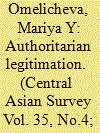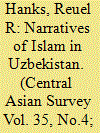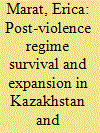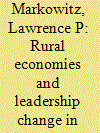| Srl | Item |
| 1 |
ID:
149735


|
|
|
|
|
| Summary/Abstract |
What are the sources of authoritarian persistence in Central Asia? This study explores the argument that authoritarian regimes persist through effective authoritarian legitimation. Drawing on the theory and analysis of discourse, it develops an approach to authoritarian legitimation and examines discursive appeals to legitimacy by the Kazakh and Uzbek presidents. The study also assesses the effectiveness of the presidential discourses of legitimacy for public perception of the governing regimes in Kazakhstan and Uzbekistan. This research shows that by defining what constitutes legitimate power and presenting political rule as consistent with this definition, authoritarian governments can foster certain modes of reasoning and evaluation among citizens, and create possibilities for their acceptance of the regime as ‘right’ or ‘proper’.
|
|
|
|
|
|
|
|
|
|
|
|
|
|
|
|
| 2 |
ID:
149739


|
|
|
|
|
| Summary/Abstract |
This article draws on the authoritarian promotion literature to assess contending pressures for democratization and authoritarianism in Central Asia. Domestic actors ultimately determine receptivity to democracy promotion, but external pressures for democratic transformation or authoritarian persistence exist in Central Asia. A brief overview of authoritarian trends in Central Asia is followed by the theoretical arguments for authoritarian persistence, with special attention to the civil society dimension in Kazakhstan, Kyrgyzstan and Tajikistan. Western programmes supporting liberal democracy and civil society have encountered resistance from authoritarian leaders in Central Asia, though the evidence for direct influence from authoritarian external actors is limited. A process of indirect authoritarian diffusion, in combination with the region’s illiberal societies and Western democracy promotion fatigue, undermines the development of civil society and makes authoritarian persistence in Central Asia likely.
|
|
|
|
|
|
|
|
|
|
|
|
|
|
|
|
| 3 |
ID:
149736


|
|
|
|
|
| Summary/Abstract |
Under the late Islom Karimov, the authoritarian regimes in Uzbekistan created dual myths of Islam. On the one hand, Islam was encompassed in the larger context of manaviyat (spirituality), and on the other, a myth of an Islamic ‘extremism’ that challenges security and stability on a regional scale was cultivated. This ‘threat’ is so pervasive and pernicious that it commands the authoritarian nature of governance that characterizes the Karimov era, leading to a Janus-state syndrome in which Islam is simultaneously cast as a sine qua non of national myth and an existential threat to state security. This article examines the mythology of political Islam in Uzbekistan and the Janus-state syndrome resulting from the duality of Islamic myth. It argues that a civil society cannot flourish in Central Asia unless moderate Islamic groups are allowed to build the very social structures that provide the foundation for interaction, peaceful coexistence, toleration and pluralism.
|
|
|
|
|
|
|
|
|
|
|
|
|
|
|
|
| 4 |
ID:
149738


|
|
|
|
|
| Summary/Abstract |
Kazakhstan’s and Tajikistan’s governments were able to successfully strengthen their reach and their capacity to control the population in the wake of deadly violence against regime opponents. Yet the process of deepening authoritarianism was not a straightforward affair. Both countries expanded their coercive capabilities – they upgraded policing in rural areas to improve intelligence gathering on the local population and predict the rise of any anti-government activities. While doing so, however, leaders of both countries sought to frame their actions as an inclusive process that was sensitive to the grievances of the affected populations and the general public. This article adds to the growing body of literature on authoritarian state responses to insurgency by showing how authoritarian regimes create narratives, engage civil society and look for political advantage to expand the coercive apparatus.
|
|
|
|
|
|
|
|
|
|
|
|
|
|
|
|
| 5 |
ID:
149737


|
|
|
|
|
| Summary/Abstract |
This article applies a political economy approach to questions of presidential succession in Central Asia. Using the cases of Uzbekistan and Kyrgyzstan, it examines how institutions governing rural economies generate, channel and distribute rents within these authoritarian regimes. In some, these institutions concentrate rents under long-standing rulers; in others they diffuse rents away from rulers. The article then specifies obstacles to leadership change that arise from these rural economies, and the crises those obstacles may pose for authoritarian regimes in the region.
|
|
|
|
|
|
|
|
|
|
|
|
|
|
|
|